TRIADS AND ORGANIZED CRIME IN CHINA
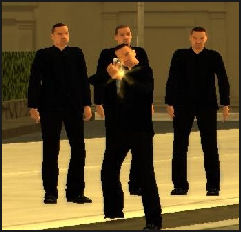
Triad Members in video game
Grand Theft AutoCriminal gangs are found throughout China but are most active in Shanghai, Tianjin, Shenyang and Guangzhou as well as Hong Kong. The number of people involved in organized crime on the mainland has risen from around 100,000 in 1986 to around 1.5 million in 2000. New members are often recruited among the 120-million-strong "floating population" of migrant workers.
Triads are the most well-known organized crime group in China, Hong Kong and Macao. In addition to them are other large organized crime gangs. The Big Circles is a loose alliance of criminal gangs founded by former Red Guards of the Cultural Revolution. Their individual names refer to the detention centers where they were "re-educated." They are active in snakehead human trafficking and other criminal operations.
Organized crime gangs are known as “black societies.” The private intelligence firm Stratfor said that, unlike in Russia and Italy, organized crime was “extremely localized.” Many criminals work in small, loosely-knit gangs that are involved in armed robbery, racketeering, smuggling, narcotics trafficking, prostitution, gambling and even contract murder. When groups began to outgrow their local area, the government cracked down with harsh penalties.
According to the judicial interpretation of the Supreme People's Court, “organizations with characteristics of a criminal syndicate” have the following characteristics: (1) a highly structured organization with a leadership, basically stable membership, and relatively strict discipline; (2) pursues economic benefit through illegal activities and possesses a certain economic strength; (3) seeks to shield itself through bribes and threats; (4) its criminal activities bring serious harm to economic and social order. [Source: the lawyer Zhou Litai, journalist Wu Wei, Beijing News, Danwei.org, October 18, 2009]
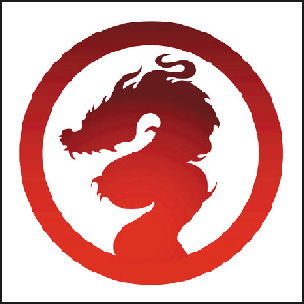
Triad symbol Organized crime is growing in China, thanks to factors including economic liberalization, increasing migration, growing inequality and official corruption. People trafficking, drug smuggling, illegal gambling and extortion are all lucrative. “Gang-related crimes have become a threat to social stability and the economy,” a Public Security Bureau official told China Daily last year. “Murder, rape, robbery, kidnapping, assault ... they dare do anything.” One indication of their presence and power in China is the increasing number of bound and gagged bodies that are pulled from the Yellow River and other Chinese waterways.
One of Henan Province's worst gangs roamed the countryside unchecked for 13 months, robbing farmhouses and killing 76 people. Seven members of the gang, including its leader Peng Miaoji, who personally cut the throat of 40 victims, were captured and executed in December 1999.
Some gangs have close relations with the police and are even run by the police. In March 2007, 10 members of a police-run gang in Inner Mongolia were sentenced to up to 20 years in prison for robbery, rape, gambling and bribery. The gang had been active for more than 10 years.
Websites and Sources: American Chinatown Gangster sfweekly.com ; Triad and Organized Crime Books and Sources orgcrime.tripod.com
Articles on JUSTICE AND CRIME IN CHINA factsanddetails.com
Triads
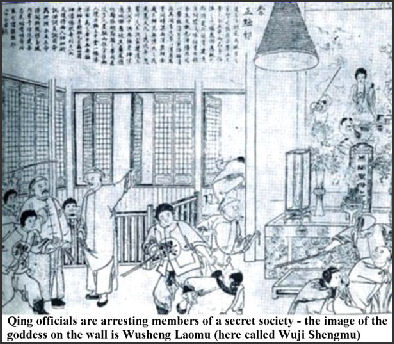
Triads are family-run organized crime gangs. They are sometimes refereed to as the Chinese Mafia or, among mainland Chinese, as "black societies." The Triads are active in China, Hong Kong, Taiwan, Southeast Asia and the Chinatowns in the United States, Canada, Australia, New Zealand and elsewhere.
Chinese Triad societies control Chinese organized crime. They are some of the world's largest crime organizations. They are believed to have more than 250,000 members, with 100,000 in Hong Kong alone.
The term "Triad" is relatively modern English term used to describe the triangular symbols found on flags and banners used by the Hung clan, also known as the Heaven and Earth Society. The bosses of the Triads are called "dragonheads."
The Triads are believed to control an empire worth many billions of dollars. The largest and most powerful Triad, Sun Yee On, is believed to have 40,000 members. The unnamed "Dragon Head" of Kong Sun Yee On, was named on Asiaweek’s list of the 50 most powerful people in Asia.
Sun Yee On is believed to be particularly well connected with the Hong Kong tycoons and Communist party elite. One high-level Communist official even referred to them as "patriotic." The second and third largest Triads respectively are Who Sing Who and 14K (14 stands for the road number of a former headquarters and K stands for Kowloon).
Book: “The Dragon Syndicates” by Martin Booth (Carroll and Graf, 1999)
History of Triads
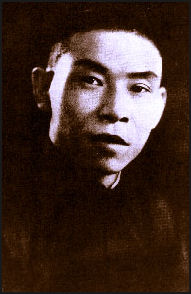
1920s Shanghai gangster
Yue Sheng
The roots of the Triads are found in centuries-old secret societies that date back to 1000 B.C., when peasants were often preyed on by evil leaders and protected themselves by forming "self help" groups. According to legend the first Triads were founded by Chinese monks committed to fighting injustices. Over time these groups, it is said, became so politically powerful they were able to prop up or bring down emperors at their whim.
The Triads developed out of the 18th century Hung Society and often worked with foreign traders to bring opium into China. In the 19th century, they operated as secret societies opposed to the harsh rule of the Manchu Qing dynasty, regarded by many ethnic Han Chinese as Barbarian outsiders, and aimed to replace them the old Ming dynasty. Some historians believe the Triads may have played a role in the toppling of the last emperor in 1911.
The Triads thrived in the warlord era in the 1920s, 1930s and 1940s, particularly in free-wheeling Shanghai, where at its height the Shanghai-based Green Gang had 100,000 members and had connections with Chiang Kai Chek and assaulted journalists who critiized the Kuomintang.
One of Shanghai's most notorious figures was Shanghai Du Yuesheng ("Big-Eared Du"), a former sweet-potato vendor who started his life of crime as a policeman collecting protection money from local opium traders. As the head of the gang that controlled Shanghai opium trade he reportedly funneled over $20 million a year to French authorities who allowed him to run his operation unhindered in the French Concession. By the 1930s, Du had become so influential that Chiang Kai-shek put him in charge of the "Bureau of Opium Suppression." Never one to be too complacent he lived in a house with a secret trap door that could be used for a quick getaway.
Some gangs helped the Kuomintang nationalist fight against the Japanese during World War II; others became gangs of criminals that raged the Chinese countryside.
After the Communist take over in 1949, Mao was able to quickly break the Triad power in the mainland. Many Triad members fled to Hong Kong and Taiwan and also to North America and Europe.
The influence of organized crime is believed to have risen as the Chinese economy slowed.
Triads in Hong Kong and China
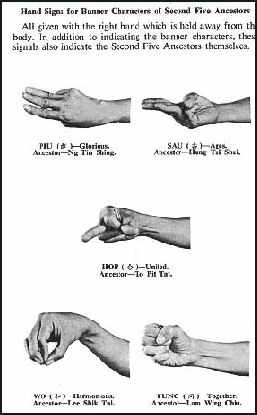
Triad hand signals
It is estimated that there are 50 or so Triad gangs in Hong Kong. The Triads have been active in Hong Kong almost since its inception. They were engaged in the local opium trade and helped and were assisted by the corrupt British police force. In 1898, corruption was so entrenched in Hong Kong that half the police force was dismissed for accepting bribes.
The British cracked down on the Triads in Hong Kong in an aggressive anti-corruption campaign that began in the 1970s, sharply curtailing the influence of the Triads on the police and the civil service. The Triads are no longer as powerful in Hong Kong as they once were. In 1997, it was estimated that only 5 to 10 percent of the "detected crime" in Hong Kong was Triad-related.
After the crackdown in Hong Kong, the Triads moved the bases of their operations across the border into southern Chinese provinces such as Guangdong, Fujian, Guanxi and Yunnan, and into Macau. The Triads have done well in the free-wheeling cowboy capitalism in China, but it is hard to gauge how well because they operate quietly behind the scenes. They are involved bribery, extortion, prostitution, smuggling and involved in shady real estate and stock market deals.
Triads, Stanley Ho and Macau
The triads have always been active in the free-wheeling gambling haven of Macau. On the eve of Macau’s handover to China in 1999, a bloody power struggle raged between rival gangs, sending the murder rate to new heights and scaring the territory’s half million residents. Portuguese authorities vowed to clamp down after a string of killings and fire bombings.
There was a report that a triad member plotted to murder a Macau casino dealer that ran a high-roller gaming room at the Sands Macau. U.S.-based Las Vegas Sands dismissed the allegation. In March 2010, a former VIP gambling room manager at Ho’s flagship Casino Lisboa pleaded guilty to laundering $450 million from an illegal horse-betting operation through Hong Kong bank accounts. U.S. investigators are examining Macau’s so-called junket operators who paid commissions to bring high rollers to the VIP gaming rooms.
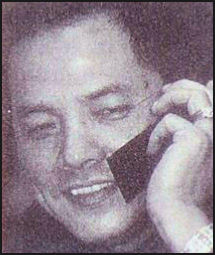
Macao gangster
"Broken Tooth" Huok-koi Steve Vickers, a former senior Hong Kong police official and now head of the International Risk Agency, told AP, “There are few overt displays of violence anymore. It’s largely been contained, The landscape has also changed quite considerably with new casinos and new [foreign] players. Macau is certainly not as “Wild West” as it once was.” The New Jersey report, he said, is “overly simplistic and poorly researched...On the darker peripheries of the gambling business there are illegal activities such as loan sharking, prostitution and other activities...That has historically been the case in Macau and will always be the case.”
In March 2010, New Jersey’s gaming commission released a previously-confidential report that alleged that gambling tycoon Stanley Go had links with Macau’s triads. The report noted that “numerous governmental and regulatory agencies have referenced Stanley Ho’s associations with criminal enterprises, including organized crime to operate and thrive within his casinos.”
Ho controlled Macau’s gaming sector for four decades until it was opened up to foreign competition in 2002. Ho’s Shun Rak Holdings responded to the commission report by saying, “There is no foundation in any suggestion that he is associated with organized crime or triads.” A senior police officer told AP that it is no surprise with the links in that organized crime has traditionally operated in Las Vegas and Atlantic City.
The New Jersey report told Las-Vegas-based MGM Mirage to cut it’s business ties with Ho’s daughter Pansy — after deeming her “unsuitable” because of her business relationship with her father at the risk of losing its state gaming license. MGM Mirage responded that it would sell its 50 percent stake in an Atlantic City casino-resorts so it could hold on to its Macau casino-hotel.
Triad Members
Triad members take many forms. In addition to being gangsters, are also respected judges, civil servants and politicians. Triad members are friendly with Communist elite but have also helped smuggle pre-democracy activists out of the country. Many gangster members call themselves Triad members even though they are not really members of Triads.
The Triads are tribal-like organizations that follow a strict Confucian code of ethics in which elders are respected. Romanticized in Asian films, the Triads have secret signs, exotic code names, and secret tattoos. Symbols are very important. A whole range of messages can be conveyed through glances and the way a cigarette is offered. The mystique that surrounds the Triads is arguably intriguing than that of the Italian Mafia.
New Triad members are initiated with elaborate rituals that can last six days and involves a highly symbolic ceremony. New candidates often begin the ritual barefoot, and wearing special clothes and perform things like salutations, special handshakes, ritual dances and Taoist and Buddhist prayers.
The Hung clan welcomes new members with thirty-six 200-year-old initiation oaths. One of them goes, "I shall not disclose the secrets of the Hung Family, not even to my parents, brothers or wife. I shall never disclose the secrets for money. I shall die by a swarm of swords if I do so." Ratting on another Triad member is one of the worst offenses a Triad member can do.
Blood letting and slitting a chicken’s throat are still use in some Triad initiation rites. One Triad ritual ends when the new recruit pledges his allegiance by shedding a few drops of blood into a cup of wine.
Triad Crime
The Triads have traditionally made their money through drug trafficking, loan sharking, prostitution, smuggling, gunrunning, and extortion and protection rackets. In recent years they have been moving more into credit card fraud, minibus concessions, call-girl rings, and computer software and CD pirating.
Sometimes Triad members are involved in extorting money from rich businessmen and contract murders. Most members are small time crooks who sell drugs and pornography on streets or involved in protection rackets or theft rings. Between 1945 and 2000, more than 700,000 reported Triad members have been arrested for a variety of crimes.
Petty criminal offenses committed by the Triads were on the rise in the mainland and in Hong Kong in the late 1990s. Officials blame high unemployment rates and a lack of job opportunities for the rise in Hong Kong.
The Hong Kong Triads have forged a large number of credit cards using information stolen from cardholders in Canada, the United States and Europe by installing recorders on credit card terminals at stores and restaurants. In some cases store clerks were bribed to get the information.
Triad Violence
Turf battles over gambling and prostitution between different Triads are fairly common. The signature Triad instrument of torture, punishment and execution is the kitchen meat cleaver. The bodies of Triad victims are sometimes horribly mutilated. Severed limbs are sometimes used as a warning. Court record give accounts of numerous victims of chop attacks.
Members of the Big Circle Triad allegedly include former commandos of the People's Liberation Army armed with AK-47 assault rifles and Red Star pistols.
In one highly publicized case involving alleged Triad violence, gangsters in business suits entered the office of Leung Tin Wai, the publisher of a feisty magazine called the Surprise Weekly, saying they wanted to talk about doing some printing work. Moments later Leung's arm and his thumbs were chopped off with a meat cleaver. No one is sure who ordered the attack but it came on the eve of a lengthy article about organized crime printed by the magazine..
Newspaper editor Jimmy Lai, who had a firebomb tossed in his yard by Triad members, told the New York Times: "I think they're very powerful — no doubt. But if they threaten me, they won't kill me. If they want to kill me, they won't threaten me."
Triad Violence in Macau and Hong Kong
In Macau, the Triads brazenly killed three civil servants and a prison guard. and bombed the car of a police chief, who narrowly escaped being killed.
In May 1997, there was a gangland-style execution in which three people were riddled with bullets while they sat in a car in the middle of the day in downtown Macau. One of the victims was Sek Weng-cheog, believed to be the right-hand man of "Broken Tooth Koi," the suspected dragon head of 14K, Macau’s largest and most notorious Triad. The murders were believed to be part of a gang war between rival Triads, 14K and smaller Soi Fong, or Water Room Triad.
A total of 14 people were killed in Macau in the first half of 1997, compared to 21 in 1996. Only one of the cases was solved. Police believe that the majority of the murders were related to the Triad war and that after the slaying the murderers slipped across the border into the neighboring mainland Chinese city of Zhuhai. Many of the slayings were execution-style hits reminiscent of gangland killing in Chicago in the 1920s.
In January, 1997, 15 people were killed in fire in Hong Kong believed to be have been started by members of Sun Yee On, Hong Kong's largest Triad, who in a turf battle with Who Sing Who, the second largest Triad.
In January, 1997, 15 people were killed in fire believed to be have been started by members of Sun Yee On, Hong Kong's largest Triad, who in a turf battle with Who Sing Who, the second largest. The turf warfare in Macau is believed to have been the result of declining revenues and battles over a pieces of the action in the gambling industry.
On the eve of Macau’s handover to China in 1999, a bloody power struggle raged between rival gangs, sending the murder rate to new heights and scaring the territory’s half million residents. Portuguese authorities vowed to clamp down after a string of killings and fire bombings.
In August 2009, a senior triad member — 41-year-old Lee Tai-hung “was knocked down by a car and hacked to death by three knifemen outside the five-star Shangri-la Hotel in Hong Kong . Lee was known as the “Baron of Tsim Sha Tsui East,” an area of Kowloon known for its bars, saunas and hostess clubs. Seventeen men and one woman were arrested in connection with the attack. The killing was believed to have been part of a long-running feud between Lee’s Sun Yee On group and the Wo Shing Wo gang.
Triads and Communists
Many leaders in China, Hong Kong and Taiwan are believed to have met with representatives of the Triads and received some help from them. Referring to the Triads, Deng Xiaoping once said, "there are many good guys among them." Before the handover, Beijing officials reportedly met with the Triad heads and said they wanted a "peaceful transition."
Triad leaders met with Communist officials before the singing of the 1984 Hong Kong handover agreement. In return for assisting the Communist in a smooth transition, the Triad leaders were told that Communism would turn a blind eye to its illegal activities.
Beijing especially wanted the support of the powerful Sun Yee On gang traditionally had ties with the nationalist in Taiwan.
The Triads also played a crucial rile in Operation Yellowbird, a network that help smuggle pro-democracy dissidents out of China after Tiananmen Square in 1989. No is sure whether the Triads were involved in the operation simply for the money or out of concern for the pro-democracy movement.
Wan "Broken Tooth" Huok-koi
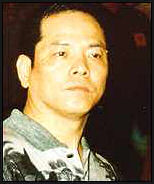
For a while the most well known mobster in Hong Kong and Macau's was Wan "Broken Tooth" Huok-koi, the leader of the 14K Triad. Short and known as a flashy dresser, he strutted in dark striped suits, cream-colored shoes and a diamond ring. He liked to spend all night in casinos and often didn't get out of bed until late in afternoon.. He turned 43 in 1998, when he was at the peak of his power, and spent several thousand dollars to get his teeth capped.
Broken Tooth Koi kept an iron grip on a large part of Macau’s underworld. He made most of his money in the late 1990s by controlling the VIP suites for high-rollers at Macau's casinos like the one at the Hotel Lisboa. He liked to gamble himself, once losing $200,000 in 30 minutes playing baccarat. In 1997 he was barred from Macau's casinos for "breaking every rule you can think of," including throwing chairs and ashtrays when he lost bets.
An estimated 10,000 gangsters regarded Broken Tooth as their boss and referred to him as "Big Brother." Wan financed a gangster film about his life called Casino and even promoted it with Hollywood-style publicity campaign. Wan was arrested in May 1998, hours after a homemade bomb destroyed a car belonging to the Macau's police chief. He was reportedly arrested while watching a U.S. gangster film. He was later given a 15 year prison sentence. Several of his top lieutenants were also jailed.
Broken Tooth continued to run the 14K Triad from prison through cell phone and giving orders through his brother who was also imprisoned. He also reportedly had frequent lady visitors to his cell. One guard who tried to bring a little discipline to the prison was gunned down outside a coffee shop on his day off. [Source: Mahlon Meyer, Newsweek, May 17, 1999]
Yip Kai-Foon and Zhang Jun
Yip Kai-foon, a professionally-trained gunman, was another well-known Hong Kong gangster. He lead a small gang notorious for robbing jewelry stores and kidnaping rich businessmen, sometimes exacting huge ransoms. He ran a crime network in Hong Kong and Gunagdong Province.
Yip was captured in 1985 but he escaped from prison four years later after pretending that he had a stomach ailment. In 1993, he pulled off one of Hong Kong's most spectacular crimes. After robbing a jewelry store, he held off police by firing an AK-47 over their heads on busy Nathan Road.
In 1996 and 1997, Yip's gang kidnapped the sons of two of Hong Kong's richest and most powerful businessmen and demanded multimillion dollar ransoms. In 1997, Yip was shot three times by a rookie policeman and paralyzed. Two years later he was sentenced to 40 years in prison in a sensational trial. Now he is in wheelchair in a cell in maximum-security Stanley Prison.
Zhang Jun lead a gang that killed more than 30 people and committed 17 robberies in five provinces between 1994 and 2000. A big fan of Hong Kong gangster films, he reportedly copied many classic cinematic Triad moves such as forcing lieutenants and mistress to show their loyalty by killing people at his whim. Other famous Macau-based gangsters include: Five Fingers Fung and Two-Nostrils Lee.
Cheung "Big Spender" Tze-Keung
Cheung "Big Spender" Tze-Keung was perhaps Hong Kong’s most notorious gangster in the 1990s. A slight man with a protruding forehead, he was small-time crook until he hit it big in 1991 when he and his gang hijacked an armored truck carrying $20 million to the airport. He earned his nickname with his purchases of dozens of dozens of top-of-the-line sport cars, including a shocking yellow Lamborghini. [Source: Dorinda Elliot and Lynette Clemetson, Newsweek, April 6, 1998]
Cheung was arrested for the armored car robbery and sentenced to 18 years but he got out after three years on a technicality. While in jail he made friends with loan sharks who reportedly chained people inside their houses and burned them if they didn't pay their debts. Cheung held such a grudge against the police for his experience in jail, he rammed a bulldozer into a prison guardhouse and firebombed the house of Hong Kong's Secretary of Security.
Cheung was the son of a poor laborer. Before he became a big time gangster he ran some gambling dens in Hong Kong and made a living as a professional gambler. After hitting the big time he traveled the world playing games of chance. He frequently flew to South Africa and reportedly once won $2 million in a single night in the Philippines.
On Cheung, Broken Tooth Wan aid, "He's a genius. He thinks I'm a genius, and I think he's a genius." Once the two men played baccarat together and Broke Tooth lost more than US$1 million. "I was really mad, I put the cards in my pocket and went home to bed. That way, I don't have to kill him or do anything to him, because I wasn't really the loser."
Cheung's gang once smuggled 1,500 pounds of explosives from Guangdong into the Hong Kong. He worked with Yip on several crimes and developed a plan to kidnap high-profile Hong Kong politician Anson Chan. In a crime that went wrong, his gang accidently killed a businessman kidnapped in Shenzhen by tying tape so tightly around his mouth he suffocated to death during a two hour ride from Shenzhen to Guangzhou.
Big Spender Kidnapping
In the 1990s, Cheung and his gang abducted two of Hong Kong’s richest tycoons — Walter Kwok, one of the world's richest property developers, and Victor Li, the son of billionaire Li Ka-shing — and held them for ransom of $210 million.
Although Kwok refuses to discuss the matter and claims it never happened, Newsweek reported that his car was forced off the road by kidnappers and he was taken away. He returned in less than 24 hours after has family paid the ransom of $80 million.
A similar scenario happened to Li. He was taken away after his purple limousine was forced off the road and reportedly kept in a refrigerator with air holes drilled in it. A ransom of $125 million ($1 billion Hong Kong dollars) was paid to free him. Cheung reportedly kept $50 million of the ransom for himself. The remaining $75 million was split among his accomplices. Some of Big Spenders gambling loses were regarded as methods to launder his money.
Big Spender's Luck Runs Out
One Hong Kong police official told Newsweek, Cheung’s “goal was to hold people in such a state of terror that all he had to do was threaten you over the phone and you would pay him big money." After an intensive man hunt, utilizing hundreds of police, Cheung and 30 members of his gang “including two in Thailand” were captured.
Cheung was arrested in mainland China. Usually, when a criminal who is wanted on charges in Hong Kong is caught in the mainland, Hong Kong police want him back. But that was not the case with Big Spender. Worried that he might get off again in Hong Kong and well aware of the harsh punishments that awaited him in China, Hong Kong refused to try to get him back.
In December 1998, Cheung and several members of his gang were found guilty of smuggling explosives and kidnapping, sentenced to death and executed within hours. It was the first time that a Hong Kong resident had been executed under Chinese law. China has a death penalty but Hong Kong doesn’t. Later 32 of Big Spenders "accomplices" — 18 Hong Kong residents and 14 from the mainland — were rounded by Chinese police. During their arrest, police seized US$5 million, 11 luxury cars and cache of weapons and explosives. Afterwards one police official said, "All the lone gangsters are out of the scene now. The Big Spender case has had the effect of scaring everyone else."
Prosecuting Triad Members
The police have used paid informers and undercover police to arrest Triad members. In 1994, the government passed laws which allowed police to expropriate the legitimate financial assets of Triad members. Even so prosecutors have difficulty nailing Triad members for big crimes partly because of human rights laws in Hong Kong that prevent entrapment. Often when members are arrested they are convicted of relatively mall crimes and serve short prison sentences.
On the mainland, the Triads often buy protection from the police, the Communist party and government officials but face harsher punishments if they can not buy their safety. See Big Spender.
In 2000, the Shanghai People's Court concluded its first big Triad trail since the 1940s, two leaders were sentenced to death but got off with two-year suspension because the crimes they were prosecuted for — blackmailing bar girls and karaoke hostesses) — were relatively minor.
In October 2009, a court in Chongqing sentenced six organized crime member to death on charges of murder assault and extortion. The crime group was involve in gambling, prostitution and corruption.
Triads and Prison
Many convicted Triad members end up at Macau's Central Prison, situated on a small island one miles off the coast. It is surrounded by a 20 foot wall and is notorious for its terrible conditions. Violence is common and guards often let the prisoners beat themselves silly and make little effort to intervene.
After a massive anti-crime campaign in 1998, 90 percent of 720 inmates at Central Prison were Triad members. The 14K Triad ran the prison. Members of Triad were kept together in one area to "keep them away from rival Triads." They came and went from their cells as they pleased, reportedly gaining privileges by paying off guards. Two prisoners were killed and several were severely beaten while they were in charge.
See Broken Tooth, Above
Hong Kong Films and the Triads
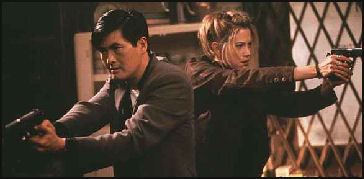
Hong Kong film The Replacement Killers
Mobsters have traditionally had strong ties with the Hong Kong film industry. Local gangs and triads often demand protection money from film crews to shoot on Hong Kong's streets. Actors who turn down film offers from the triads and directors that have refused to cast triad-supported actors have received death threats and visits from armed gangsters. There have also been reports of harassment and extortion and even rapes and kidnaps. In 1992, two prominent producers were murdered.
One Hong Kong detective told the Los Angeles Times that most gangsters got into the film industry to make a quick buck but some took the film industry seriously. Charles Heung, a former actor and son on the leader of the powerful Sun Yee On triad, became president of one of Hong Kong's largest entertainment companies. Heung has been praised in the filmmaking industry as being "one of the good gangsters." The Director Wong Kar-wai even went as far as saying, "It's better to deal with a godfather than an accountant."
The film industry fought back against the triads by calling in police to protect their film sets and arrest people demanding protection money. The triads have been less active in films since 1994, when the government passed laws which allowed police to expropriate the legitimate financial assets of triad members. Starting around that time the Triads began killing the Hong Kong film industry through intensive production of pirated videos, VDCs and DVDs.
Triads in Other Countries
The yakuza in Japan has collaborated with triads to smuggle immigrants, sell doctored passports and engage in credit card fraud. Triads have forged a large number of credit cards using information stolen from cardholder in Canada, the United States and Europe by installing recorders on credit card terminals at stores and restaurants. In some cases store clerks were bribed to get the information.
Before World War II most heroin was produced in laboratories in Shanghai and Tianjin China and production and distribution there was largely overseen by Chinese triads. World War II and the Communist takeover of China ended heroin production in China. After World War II the Mafia took advantage of a weak government in Italy and deal struck between Mafia leader Lucky Luciano and American military intelligence to set up heroin labs in Sicily. Chinese gangs are still believed to be major players in the world narcotics trade, especially with herioin coming out of the Golden Traingle in Southeast Asia, but the extent of the involvement is unknown.
Organized crime groups from China are active in the United States. In Chinatowns in America and Europe organized crimes is usually associated with "Tongs,' community groups associated with the Chinese triads that were created in the early 20th century to help overthrow the Qing dynasty.
Chinese Gangs in Japan
The influence of foreign organized crime groups is growing in Japan. A new Chinese gang known as the Jinshan Group has targeted Chinese-run restaurants and shops around JR Ikebukuro Station in Tokyo. Attention was brought to these gangs after a karaoke operator was severely beaten by a chair by men of Chinese descent who had just arrived in Japan. The operator reportedly failed to pay ¥50,000 a month protection money. The Jinshan group has about 30 members
One Chinese gang, the Dawei Group, is active in Ueno and Kinshicho in Sumida ward, Tokyo. It reportedly has 200 members who collect ¥30,000 to ¥50,000 a month protection money from shops and restaurants operated by Chinese but also sells drugs and is involved in robberies. Many of the members are children or grandchildren of Japanese left behind in northwestern China in the closing days of World War II and experienced adjustment problems when they came to Japan. Some of those formed the “Dragons,” a group of gangsters linked with a number of robberies in the late 1980s.
Chinese gangs are starting to occupy turf long held by the yakuza. One yakuza member told the New York Times, "Our biggest problem is the rise of the Chinese mafia. The Chinese gangs are taking business from us in every area — in prostitution, in gambling, in fencing stolen goods...The Chinese are very, very good at business."
Chinese gangs are regarded as more ruthless and clever than the yakuza. The yakuza member complained, "The difference between us is that Japanese yakuza think of long-term relationships, but the Chinese mafia thinks just of the short term. Their only goal is money, money, money...For Japanese yakuza, the most important thing is staying alive, and making money is second. But for the Chinese gangsters, the first thing is money. The second is money. And the third thing is money."
Crimes by Chinese Gangs in Japan
Chinese gangs have moved aggressively into forging passports and making fake magnetic-strip cards that allow people to win prizes at pachinko parlors. They reportedly charge only $2,700 for a contract killing. In Kabukicho in Tokyo many of the prostitutes and sex workers are Chinese who work for Chinese gangs rather the yakuza.
The Hong Kong triads have forged a large number of credit cards using information stolen from cardholders in Canada, the United States and Europe by installing recorders on credit card terminals at stores and restaurants. In some cases store clerks have been bribed to get the information.
Many Chinese who have been arrested and deported for crimes return within six months using false passports.
Future of the Triads
When asked what was going to happen to the Triads, one crime officials told UPI, "Whilst almost certainly some criminals will move overseas, the majority most definitely will not. There are various reasons: some will be unable to severe family ties, some will lack the financial support required to resettle."
The Triads are believed have set up allegiances with organized crimes gangs in the former Soviet Union, developed "logic bombs," encrypted algorithms that prevent outsiders from accessing their computer systems.
Hong Kong drug syndicates are reportedly being out muscled by other gangs.
Organized Crime and Communist Party Officials in China
Chen Tianben, professor of public security at the Chinese People's Public Security University, said organized crime was a problem in many Chinese cities, with some senior officials offering a “protective umbrella.” [Source: Tania Branigan The Guardian (August 19, 2009]
In cities like Beijing and Shanghai, the lack of political accountability, judicial independence and media scrutiny have created ripe conditions for mobsters to collude with corrupt officials in setting up illegal businesses and extorting money. [Source: Jonathan Watts, The Guardian, October 21, 2009]
Police often paid off to protect gangsters. “We have to pay off the gangsters and the police,” a club manager in Shanghai told the Guardian. “There are two brothers in the city who always dine together. One is a cop, one is a mob leader. These people are our customers, but they are very dangerous.”
Party bosses all over China could emulate Chongqing Communist Party chief, Bo Xilai — who launched a major crackdown on crime in his city (See Below) — but don’t because most of them choose to ignore the status quo of corruption and collusion.
Fighting Organized Crime
According to official figures released last month by an agency working under the Communist Party's Central Committee, police have eliminated 1,221 gangs since 2006 and arrested more than 87,300 suspects. [Source: Tania Branigan, The Guardian, August 19, 2009]
Chen warned that anti-crime drives were a superficial solution, adding that other groups would form elsewhere. “We need to solve the deeper problems; only by carrying out proper reforms to improve our system can we solve the problem at its root. For example, some officials believe their powers override the rule of law.” he said.
Yang Shukuan, a gun-toting Chinese officials and crime gang leader who owned two Ferraris and liked to drive around in an armored personnel carrier, was given life in jail for illegal weapons possession and fraud in the northern city of Tangshan in 2008. According to the China Daily, “Yang and other nag members had dominated the area in which they lived bullying locals and causing untold damage to the local economy.”
In December 2008, the Chinese government announced the creation of a new special unit aimed at cracking down on gun-related crimes and organized crime such as organized prostitution, gambling, drug production and trafficking.
See Crime Fighting Efforts, Police
Image Sources: Columbia University, Tales of Old Shanghai website and various websites and blogs, You Tube
Text Sources: New York Times, Washington Post, Los Angeles Times, Times of London, National Geographic, The New Yorker, Time, Newsweek, Reuters, AP, Lonely Planet Guides, Compton’s Encyclopedia and various books and other publications.
Last updated April 2012
